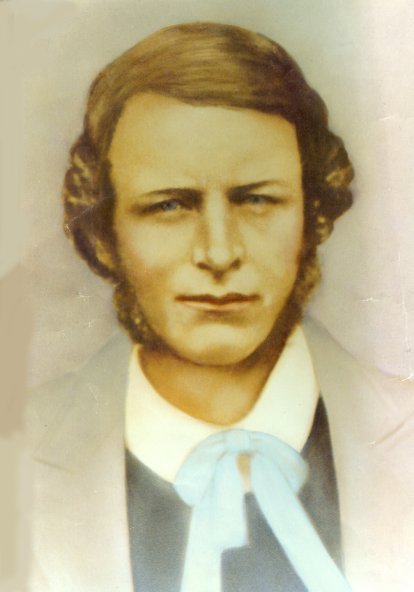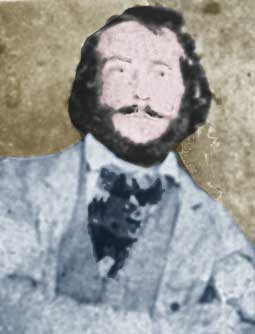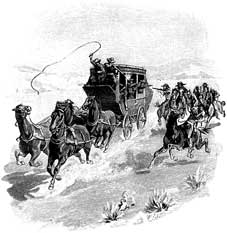With the incredible amounts of gold being mined at the diggings around Bathurst and Ballarat there was a need for
safe and secure transportation to the capital cities. Gold escorts were introduced to secure these large gold movements, mostly under
armed police guard.
One such escort left Forbes, in NSW, for Orange, 185km east, on Sunday 15th June 1862, with some £14,000 of gold and cash. The driver was John Fagan
and the guard comprised Sergeant Condell, who rode on the box with him, and three constables in the coach.
At Eugowra Rocks, the driver saw three bullock teams stopped along the road, and had to negotiate a small gap, not realizing it
was a trap arranged by Frank Gardiner and his gang. Suddenly they were confronted from behind the
Eugowra Rocks by a band of at least 6 armed outlaws dressed in red shirts, who each fired a volley into the coach. One
round struck Sergeant Condell in the side knocking him from the coach, and although several shots entered the carriage the three
troopers inside were not wounded. In the panic they were unable to return fire for a few moments, while the six bandits
withdrew to be replaced by another six who fired a second volley into the carriage. The troopers now
returned fire though the firing frightened the horses which bolted into the scrub overturning the coach.
Ambushed and hopelessly outnumbered the troopers withdrew. They had lost some of their arms, all of the horses
and the entire gold shipment, but they were all alive.
Police at Forbes quickly set out in pursuit, with 11 troopers, two black trackers and several civilian volunteers. The blacks
tracked the bushrangers towards the Wedden mountains, and came upon their recently occupied camp and some discarded mail. The
police commander, Sir F. Pottinger split his force with Sergeant Sanderson, four men and a black tracker in a separate group.
Sanderson followed the fleeing bushrangers towards the Wedden Mountains despite efforts to disguise their tracks, until eventually a lone
rider was seen moving down a steep bush track. He was intercepted and, during a minor skirmish, one of his horses was captured and a
considerable amount of the proceeds were retaken, including a large amount of gold, and several firearms.
Pursuit was maintained until dark, when Sanderson considered it prudent to return to Forbes to refresh their horses and secure the gold.
Meanwhile, Pottinger and his men were following tracks towards Hay in the Riverina District to the southwest, and towards Victoria where he knew
Gardiner felt comfortable. The trail had gone cold, but in a chance encounter on the road home they met 3 well dressed young men mounted and
leading a horse each.
Pottinger asked for proof that the horses were indeed theirs and a melee resulted with two of the men arrested at gunpoint, one of them escaped.
A small quantity of gold and some pounds quickly identified as being proceeds from the robbery were recovered.
Returning towards Forbes the next day the group was confronted by seven armed bushrangers intent on rescuing their mates, and recovering the
gold and money. Some shooting occurred, and the two bushrangers escaped, and Pottinger withdrew keeping the recovered property
secure.
The police party knowing that there was a strong likelihood of the armed bushrangers making more attempts to recover "their" booty
travelled through the night to Narraburra. Incredibly the police in pursuit were now the pursued. Pottinger sent a messenger forward
to Captain Bettye at Lambing Flat and arranged for 11 troopers to converge on Narraburra to aid them.
The bushrangers had by this time disappeared. The local police arrested several suspects in and around the gold fields while
Senior Sergeant Sanderson, recently promoted, arrested five more at Wheogo. Money found on these men matched that
stolen during the robbery.
The legal process began and one of the arrested men confessed to Senior Sergeant Sanderson. He implicated others and exonerated some of
those arrested. After three months of legal manoeuvering the case was to come before the Bathurst Circuit Court.
Many prominent citizens of Bathurst, fearing the public would begin to sympathize with the Gardiner gang after long delays, petitioned
the Government to bring the prisoners involved in the robbery to trial immediately. The government granted the petition but moved the
trials to Sydney Town. This disturbed the citizens of Bathurst as they well knew it would be much more difficult to obtain a conviction in Sydney Town.
At the first attempt at a formal trial of the first three charged, the jury was unable to agree on a
verdict and was subsequently discharged. On the second trial, 4 prisoners were tried and three were found guilty, and one not guilty.
Those convicted were sentenced to death by hanging. Their friends, and they were many, agitated and presented petitions with up to
10,000 signatures to the Government and eventually had the death sentences commuted to life in prison for two of the three condemned.
One man named Manns, was eventually hung by the neck until dead, for this crime, despite pleas for clemency.
Of those involved in the robbery, only three were ever brought to trial. Others involved, namely Gilbert, Hall and O'Meally, were shot
dead while involved in other unrelated crimes. Gardiner on the other hand was never brought to trial for this robbery although he was
captured in Queensland and returned to New South Wales and tried for other unrelated matters, where he was given a long sentence of 32
years imprisonment. The majority of the proceeds from the Eugowra gold robbery were never recovered.
Frank Gardiner, served 8 years of his sentence before being granted a pardon and was released on condition he leave the dominions of
"Her Majesty". He was placed under guard on a ship and eventually made his way to San Francisco where he became the owner of a popular
saloon. It appears that here he remained, plying his trade for some years and died there a free man.
Abridged from a story by Craig Wilson
|



